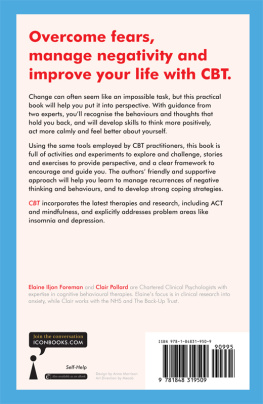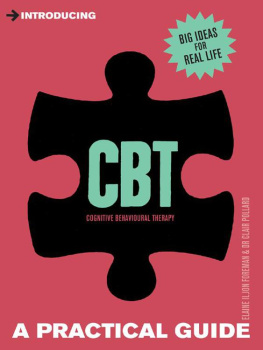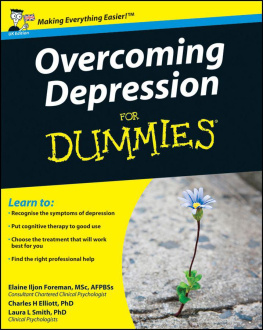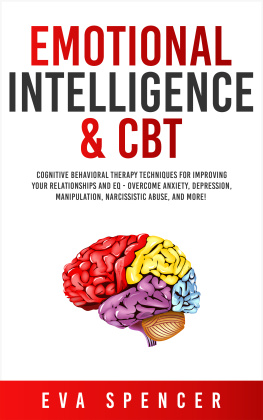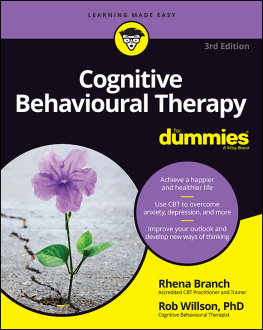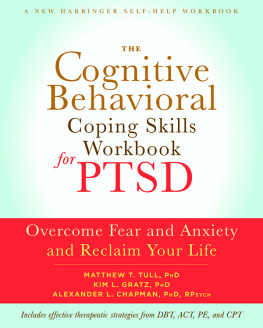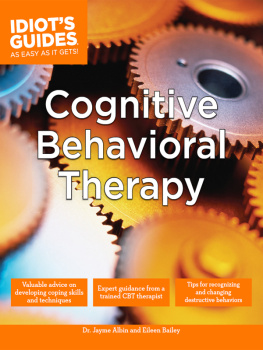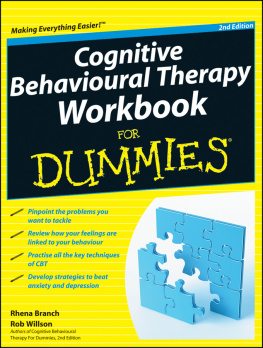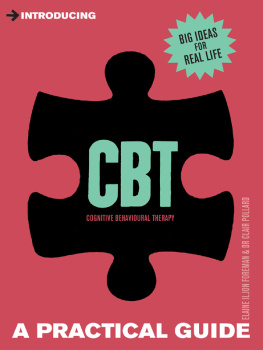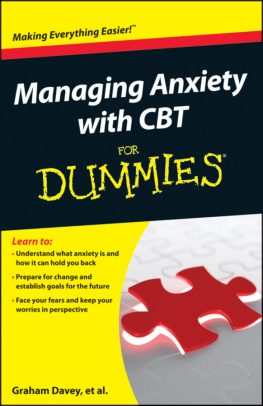CBT
Cognitive Behavioural Therapy
Elaine Iljon Foreman & Clair Pollard
CBT
Cognitive Behavioural Therapy
YOUR TOOLKIT TO MODIFY MOOD, OVERCOME OBSTRUCTIONS AND IMPROVE YOUR LIFE

Published in the UK in 2016
by Icon Books Ltd, Omnibus Business Centre,
3941 North Road, London N7 9DP
email:
www.iconbooks.com
First published in the UK in 2011 by Icon Books Ltd
Sold in the UK, Europe and Asia
by Faber & Faber Ltd, Bloomsbury House,
7477 Great Russell Street,
London WC1B 3DA or their agents
Distributed in the UK, Europe and Asia
by Grantham Book Services,
Trent Road, Grantham NG31 7XQ
Distributed in Australia and New Zealand
by Allen & Unwin Pty Ltd,
PO Box 8500, 83 Alexander Street,
Crows Nest, NSW 2065
Distributed in South Africa
by Jonathan Ball, Office B4, The District,
41 Sir Lowry Road, Woodstock 7925
Distributed in India by Penguin Books India,
7th Floor, Infinity Tower C, DLF Cyber City,
Gurgaon 122002, Haryana
Distributed in Canada by Publishers Group Canada,
76 Stafford Street, Unit 300
Toronto, Ontario M6J 2S1
Distributed in the USA
by Publishers Group West
1700 Fourth St., Berkeley, CA, 94710
ISBN: 978-184831-950-9
Text copyright 2011, 2016 Elaine Iljon Foreman and Clair Pollard
The authors have asserted their moral rights
No part of this book may be reproduced in any form, or by any means, without prior permission in writing from the publisher.
Typeset in Adobe Caslon by Marie Doherty
Printed and bound in the UK by Clays Ltd, St Ives plc
About the authors
Elaine Iljon Foreman is a Chartered Clinical Psychologist specializing in the treatment of anxiety-related problems. Her clinical research into Cognitive Behavioural Therapy techniques, developed over 30 years, has meant she is regularly in demand by the media for her expert contribution. Elaines research into the treatment of anxiety and particularly fear of flying has generated invitations to present her research in this field across Europe, the Americas, Australia, the Middle and Far East.
Dr Clair Pollard is a Chartered Clinical Psychologist and is accredited by the BABCP (British Association for Behavioural and Cognitive Psychotherapies). Clair works in the NHS with adults with mental health problems and for a charity called The Back-Up Trust, working with people with spinal cord injury. Clair has a particular interest in issues around adjustment to disability and in post-traumatic coping and growth.
Acknowledgements
A books value is based on its usefulness to the reader. Ian McLeod, Visiting Professor of Law at Teesside University has provided invaluable input to enhance clarity and simplicity, contributing greatly in the usefulness stakes. Our very grateful thanks are expressed to Ian and also to Duncan Heath, our editor, and his team at Icon Books for their assistance in making this book amongst the most useful in enabling people to change.
We would also like to acknowledge the following people who have made particularly significant contributions to the development and practice of CBT and on whose work we have drawn:
Aaron T. Beck, Judith Beck, Gillian Butler, David Clark, Albert Ellis, Paul Gilbert, Ann Hackman, John Kabat-Zinn, Paul Kennedy, Marsha Linehan, Stirling Moorey, Christine Padesky, Paul Salkovskis, Maggie Stanton, Richard Stott, John Teasdale, Adrian Wells and Mark Williams.
Dedication
No man is an island, it is said nor woman either. We would like to thank the rocks surrounding us (you know who you are) who have given such support and encouragement in our writing and in everything else. On your solid foundation we can stand firm and strong, deal with life, and enjoy!
Authors note
Its important to note that there is much frequently-used research employed in cognitive behavioural therapy. Where we know the source we have been sure to reference it, but our apologies here to the originators of any material if we have overlooked them.
CHAPTER 1
Introducing CBT
Men are disturbed not by things but by the views which they take of them when, therefore, we are hindered, or disturbed, or grieved, let us never blame anyone but ourselves: that is, our own judgments.
Epictetus, Greek philosopher
COGNITIVE BEHAVIOURAL THERAPY: WHERE DID IT COME FROM?
Some readers may be familiar with the name of Pavlov, and his early experiments in the 1900s looking at the way in which dogs can be conditioned to salivate at the sound of a bell. What many people dont know is that Pavlov was actually studying the digestive system of dogs and just happened to observe this conditioned reflex. However, he opened up a whole new field of study, allowing new insights into understanding the way in which animals learn. From there, it was but a small step to transfer this knowledge from four-legged to two-legged creatures. So the field of behaviour therapy was born. It stemmed from applying the principles of learning theory to shaping the behaviour of first animals and eventually humans, looking at ways in which altering behaviour might help alleviate psychological disorders.
Dr Aaron Beck, originally a psychoanalyst, is generally credited with founding cognitive therapy in the 1970s. Working with depressed patients, he noticed they experienced a series of spontaneous negative thoughts, which he called automatic thoughts. He divided them into 3 categories: negative thoughts relating to the self, to the world and to the future. Working to identify and challenge these thoughts enabled patients to re-evaluate them more realistically. The result? The patients felt better and showed positive changes in behaviour. They became able to think in a more balanced, realistic way; to feel better emotionally and to behave in a more functional manner. The key concept of cognitive therapy concentrates on how we process information, organize it, store it, and relate new information to old. In cognitive therapy we focus on understanding the way in which humans think and applying these principles to the treatment of psychological disorders.
In the 1970s and 1980s furious debate raged over whether behaviour therapy or cognitive therapy held the key to understanding and overcoming psychological difficulties. Eventually, although there is no general agreement of exactly when, it became clear that this wasnt a contest with a winner and a loser. People neither operate on purely behavioural principles, nor live their lives based purely on thinking. It is in this realization that we find the roots of CBT.
There is an apocryphal tale of a paper written in the early 1990s. It was about understanding the nature and treatment of a particular anxiety disorder. The author believed in its importance (which author doesnt?!) and was convinced that the research had international significance. But there was a conundrum two world conferences appeared to address the subject matter. One was the World Congress of Behaviour Therapy, the other the World Congress of Cognitive Therapy. The two were apparently miles apart, the conceptual separation reflected geographically, with one taking place in Canada, the other in Australia!
How to make a decision? As a behavioural experiment, the author sent an identical abstract to both. The result? BOTH were delighted to accept the paper as truly representative of research in that field! This is actually no shaggy dogs tale the author in question is the first author of this book!
So what happened the following year? A historical first took place the first World Congress of Behavioural and Cognitive Therapies. This fortunately meant that from then on, Elaine only had to submit her research to one conference, instead of two!
Next page
